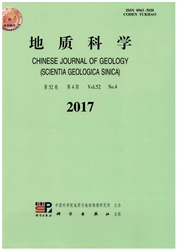

 中文摘要:
中文摘要:
针对准噶尔盆地南缘(天山北麓)中生界及新生界4个砂岩样品的碎屑锆石,本文开展了LA-ICP-MS分析,解析了其U-Pb年代学、沉积物源及其构造属性等信息,探索了天山及其邻近盆地的表壳演化过程及动力学机制。研究显示,准噶尔盆地南缘上三叠统—中侏罗统碎屑锆石年龄构成总体宽泛复杂,在490~160 Ma之间出现多个谱峰:除310~260 Ma主峰外,尚有180~160 Ma、240~210 Ma、370~340 Ma、450~390 Ma和490~460 Ma等5个次峰; 上侏罗统—下白垩统碎屑锆石年龄构成相对简单,但仍然保留400~250 Ma较宽范围内的2~3个谱峰:除310~260 Ma主峰外,尚有340~315 Ma等次峰; 上白垩统—古近统,主物源碎屑锆石年龄构成趋向单一,峰值区间集中于310~260 Ma。研究说明天山与准噶尔盆地之间的构造分异活动可以分为4个阶段:中晚三叠世—中侏罗世平稳或渐弱,向准噶尔盆地输运碎屑物的天山水系较宽,可达南天山北缘; 晚侏罗世—早白垩世欧亚板块与拉萨块体碰撞的远程效应对天山古生代构造格局造成了强烈的叠加改造,天山区域整体抬升剥露加剧,并伴随主分水岭相对北移; 晚白垩世—古近纪北天山继续隆升(尽管相对变弱),并直接构成向准噶尔盆地(南缘)输运碎屑物的主水系,新近纪由于欧亚板块与印度板块碰撞引发的天山陆内强烈隆升并未明显改变这一物源输运系统。
 英文摘要:
英文摘要:
For the Mesozoic and Cenozoic outcrop profile in the southern Junggar Basin(northern piedmont of Tianshan),northwest China,four sandstone samples were chosen,and their detrital zircon U-Pb isotopes were measured by LA-ICP-MS method.Based on geochronology,provenance and tectonic attribute analysis of the detrital zircons,this research further explores sedimentary crust evolution and its geodynamic mechanism of the Tianshan and adjacent basins.The paper shows that the Middle Jurassic detrital zircons in the southern Junggar Basin are characterized by relatively wide and complex U-Pb ages between 160 Ma and 490 Ma:including one main age peak in 310~260 Ma and five minor age peaks in 180~160 Ma, 240~210 Ma, 370~340 Ma, 450~390 Ma and 490~460 Ma,respectively.The Upper Jurassic detrital zircon U-Pb ages distribute in relatively narrow range of 400~250 Ma:minor age peaks in 340~315 Ma beside one main age peak in 310~260 Ma.The Upper Cretaceous-Paleogene detrital zircon U-Pb ages tend to single peak,that is,ranging in 310~260 Ma.The above evidences illustrate four phases to basin-range tectonic evolution existed in the study area.Stable and weak tectonic activity developed in the Middle-Late Triassic-Middle Jurassic period,with main watershed occurred in the southern Tianshan.Regional and whole uplift became evident in the Late Jurassic-Early Cretaceous period,with main watershed north migrating in the Tianshan,which mostly resulted from long-distance effect of the Eurasia-Lhasa collision event.Following to relatively weakening tectonic activity in the Late Cretaceous-Paleogene period,the most intensive uplift of Tianshan area occurred in Neogene,which gradually resulted in distinctive watershed systems in the north and south Tianshan,respectively.Therefore,the southern Junggar Basin began to accept relatively single provenance type from the north Tianshan after Early Cretaceous,and this provenance constitution for the southern Jungar Basin-fill reserved up to the present in spite of the Neoge
 同期刊论文项目
同期刊论文项目
 同项目期刊论文
同项目期刊论文
 期刊信息
期刊信息
